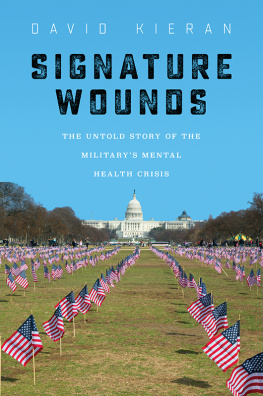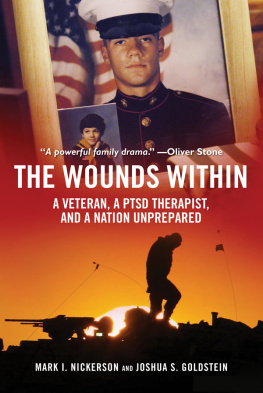NEW YORK UNIVERSITY PRESS
New York
www.nyupress.org
2019 by New York University
All rights reserved
References to Internet websites (URLs) were accurate at the time of writing. Neither the author nor New York University Press is responsible for URLs that may have expired or changed since the manuscript was prepared.
Library of Congress Cataloging-in-Publication Data
Names: Kieran, David, 1978- author.
Title: Signature wounds : the untold story of the militarys mental health crisis / David Kieran.
Description: New York : New York University Press, [2019] | Includes bibliographical references and index.
Identifiers: LCCN 2018037659 | ISBN 9781479892365 (cl : alk. paper)
Subjects: LCSH: SoldiersMental healthUnited States. | SoldiersMental health servicesUnited States. | VeteransMental healthUnited States. | VeteransMental health servicesUnited States. | CombatPsychological aspects. | Military psychiatryUnited States. | Psychology, Military.
Classification: LCC UH629.3 .K54 2019 | DDC 362.2088/35500973dc23
LC record available at https://urldefense.proofpoint.com/v2/url?u=https-3A__lccn.loc.gov_2018037659&d=DwIFAg&c=slrrB7dE8n7gBJbeO0g-IQ&r=gT953V3c8BdcJV4pugGaWueY1IXCnXKbUfEC8Smo3jI&m=MP-GJ562mYu3PDS2bpIlm5Je-F1nOhMD8wY8j_PuQXs&s=JoWU-6XhWTJXgcE4pILvVbUsYQKRY5HRoHJbxKj009w&e=
New York University Press books are printed on acid-free paper, and their binding materials are chosen for strength and durability. We strive to use environmentally responsible suppliers and materials to the greatest extent possible in publishing our books.
Manufactured in the United States of America
10 9 8 7 6 5 4 3 2 1
Also available as an ebook
These Unseen Wounds Cut Deep
On November 14, 2004, the Los Angeles Times published a troubling headline. These Unseen Wounds Cut Deep it read, with the subtitle A Mental Health Crisis Is Emerging, with One in Six Returning Soldiers Afflicted.
Within two years, the term had become plural. In February 2007, Washington Post reporters Dana Priest and Anne Hull published a series of articles exposing the poor conditions under which patients were living at the Walter Reed Army Medical Center, the militarys largest and most prominent hospital.
This media coverage and political rhetoric reveals that, in the course of the U.S. twenty-first-century wars, Americans have become increasingly preoccupied by the mental health and cognitive issues that troops have developed as result of their service, particularly in Iraq and Afghanistan. Why werent the Army and the Department of Veterans Affairs (VA) more effectively screening for PTSD and mTBI? Why were troops being denied care, sent back to Iraq despite their mental health needs, or discharged from the military without benefits? Why were so many soldiers and veterans killing themselves? Why wasnt the Army and the VA doing more to address these issues? These examples also illustrate that these conditions took on a range of meanings: They were, in the Los Angeles Timess and Obamas usage, cause for deep concern. For the New York Times, they were evidence of the Bush administrations disingenuousness, malfeasance, and indifference. For Geren, they were challenging problems that required research.
Signature Wounds examines how Americanspolicy makers, military leaders, caregivers, Army and VA researchers, and the broader publicunderstood the mental health issues that the United Statess twenty-first-century wars generated and how they mobilized those understandings to engage in broader political and cultural debates about the wisdom and management of the Iraq and Afghanistan Wars, the militarys place in American culture, and the United Statess role in the world. This story It unfolds by analyzing the intersecting and often intertwined ways in which these stakeholders understood these issues and debated their significance. In media, popular culture, and political rhetoric, the increasing incidence of post-traumatic stress disorder, traumatic brain injury, and soldier and veteran suicide was evidence that the Iraq War was misbegotten and mismanaged by a callous administration unwilling to acknowledge or address the human consequences of its misguided policies. For researchers and clinicians, these issues were complicated but solvable medical problems, conditions about which there was great uncertainty and that demanded rigorous research around prevention, diagnosis, and treatment. For Army leaders, they were at once tactical dilemmas that required immediate attention amid the demands of two prolonged wars and evidence of a crisis that raised larger, existential questions about military institutions and their place in the nation.
These three discourses were not discrete. In the decade that followed the United Statess invasion of Iraq, they often intersected, and the resulting debates were sometimes acrimonious. Members of Congress and senators who seized upon notions of mental health issues to fuel anti-war critiques often looked askance at Army researchers who maintained that combat stress was expected if not inevitable and usually temporary and treatable, raged at Army policies that allowed troops with mental health diagnoses to deploy to Iraq, and portrayed VA officials who maintained that they were making effective inroads in addressing veteran suicide as emblematic of the administrations broader dishonesty. Soldiers, veterans, and their families frequently felt that Army and VA leaders were merely paying lip service when they claimed to be aware of and working to address mental health needs, and they criticized a system that they viewed as bloated with self-interested bureaucrats. Veterans Administration officials grew increasingly frustrated when anecdotal accounts that the failure to treat a particular veteran had resulted in a suicide overwhelmed their claims to be providing the best evidence-based care available. Inside the Army Medical Department, or AMEDD, researchers worked to develop protocols for understanding how deployments affected troops psychological well-being, to determine the etiology of traumatic brain injury, and to prevent suicide, and they butted heads internally over competing theories and externally with a larger Army that was often resistant to taking mental health seriously. Army leaders worried about their troops well-being grew frustrated with Army doctors who maintained that applying a treatment that hadnt been fully vetted was unethical. And as the stress of prolonged warfare increasingly took a psychological toll on soldiers and their families, Army researchers and leaders worried that the culture that the Army had built during its post-Vietnam recuperation, if not the All-Volunteer Force itself, was imperiled.
The story of mental health during the Iraq and Afghanistan Wars, then, is multifaceted. Looking back on the Armys efforts to understand and address these issues, Lt. Gen. Eric Schoomaker, who served as Surgeon General from 2008 to 2011, reflected that I dont think any of us had a complete picture of it at any one time; instead, he argues, there were many, many competing viewpoints, agendas, and many multi-generational issues that we were facing. The story of mental health during this war is the story of how different groupssoldiers, veterans, and families; anti-war politicians and the general public; researchers and clinicians; and military leadersapproached these issues from different perspectives, with different agendas, and valuing different kinds of evidence. It is the story of how the advancement of medical knowledge moves at a different pace than the needs of an army at war and of how medical conditions and medical knowledge intersect with larger political questions about militarism and foreign policy.









